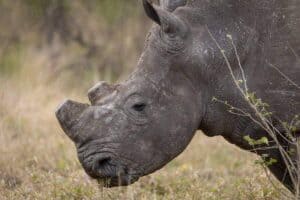The conservation organisation called on all countries implicated in the illicit trade in rhino horn to collaborate and address wildlife trafficking as a transnational syndicated criminal activity.
It would be premature to regard the statistics for 2016 that show a continued decline in the number of rhinos illegally killed in South Africa over the past two years, as released by the department of environmental affairs last Monday, “as a reversal in the fortunes for SA’s rhino population”, the World Wide Fund for Nature in South Africa (WWF-SA) warns.
The WWF-SA further stated last Monday, after the statistics were released by the department, that it was concerning the poaching figures showed an equivalent of three rhinos a day were lost to poaching and smuggling syndicates.
ALSO READ: Possible decline in rhino poaching
In a statement, the WWF-SA said: “The reported reduction of nearly 20% in the number of rhino carcasses found in Kruger National Park to 662 is to be applauded in the face of the increased number of illegal incursions into the Kruger National Park. However, the apparent decline in numbers of white rhinos within the park must be a cause for concern.
“Furthermore, we note that criminal syndicates have shifted their focus in response to these law enforcement actions, and the impacts of poaching have swept across South Africa. Key populations in KwaZulu-Natal, in particular, faced this impact in 2016, with 161 rhinos killed in that province, an increase of 38 percent from the previous year.”
While the WWF-SA was positive about the “focused efforts” of the South African Police Service, which showed an increase in arrests, and the Directorate for Priority Crime Investigation, which disrupted and combated wildlife trackers last year, the independent conservation organisation said, “the rate of successful prosecutions still remains to be seen”.
“We call on all countries implicated in the illicit trade in rhino horn to collaborate and address wildlife trafficking as a transnational syndicated criminal activity. In addition to on-going anti-poaching efforts at country level, we need to see tougher law enforcement and prosecutions of syndicates implicated in the transnational trafficking and use of rhino horn, including high level syndicate members located in source, transit and market countries, such as Mozambique and Viet Nam,” said WWF-SA.
Dr Jo Shaw, rhino programme manager for WWF-SA, commented: “A decade has now passed since the initial upsurge in poaching in South Africa and huge effort has been invested in rhino protection yet the situation is still out of control and the toll on those working to address the challenge in the region is also unsustainably high.”
Shaw said a more holistic approach in addressing the drivers of wildlife crime was needed, rather than “military-style interventions” that provided short-term wins but came with “longer-term financial and socioeconomic costs”.
“In terms of the draft regulations for domestic trade in rhino horn, we are seriously concerned about the challenges that law enforcement and permitting officers would face in trying to manage parallel legal and illegal trade and exports – especially around linkages to international wildlife trafficking networks and will be submitting detailed comments to the department in this regard,” said Shaw, adding that corruption hampered efforts at all levels.
“This year must see greater collaborative partnerships between conservation and anti-corruption communities to deepen understanding of corruption risks and mitigation strategies.”
For more news your way, follow The Citizen on Facebook and Twitter.






